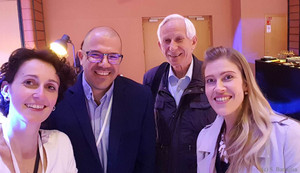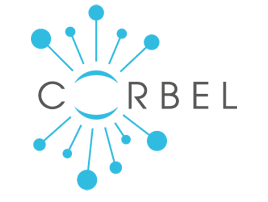| | 1st CORBEL Open Call: 21 research projects accepted
The CORBEL Open Call for Research Projects at the end of 2016 generated a lot of interest among European scientists and attracted over 30 project applications. Among all eligible projects, 21 were finally accepted as CORBEL user projects, following careful scientific and technical evaluation.
Over the coming two years, European researchers from nine different countries will benefit from access to service providers across eight participating biological and medical research infrastructures (RIs). In an attempt to support all aspects of selected projects, CORBEL even paved the way for access to additional RIs that did not participate in this Open Call. Taken together, CORBEL travel grants will enable nearly 50 visits with transnational access between successful applicants and their chosen service providers.
Project proposals came in many different shapes and forms: Applicants combined requests for high-end imaging technologies with mouse phenotyping services. Others were interested in integrating bioactivity profiling for chemical compounds with dynamic network modelling, to name a few.
The staggering interest in the CORBEL Open Call underlines the need for pioneering technologies and innovative services in modern research projects in Europe. As successful applicants are now starting to organise their visits to different service providers, CORBEL will gain more experience on how access to multiple RIs can be facilitated. This will benefit the wider European research community in opening up cutting-edge technologies and services offered by European RIs.
Innovation Office Helpdesk – new documents available
The CORBEL Innovation Office Helpdesk, intended to assist RIs with collaboration with industry and technology transfer, made available a set of new documents:
- Basic Aspects for Budgeting
- Operating Principles of the Innovation Office Helpdesk
Enjoy reading!
The CORBEL Innovation Office team is organising a meeting on how innovation can be supported by open access, for details see the section Upcoming Events below. |
| | This section will focus on one of the eleven research infrastructures participating in CORBEL, providing useful information for current and future users. In this issue, EATRIS-ERIC is introduced to the researcher community. |
| |  |
EATRIS-ERIC is the European infrastructure for translational medicine, providing high quality services in the early development of novel therapeutics and diagnostics.
Translational research is defined as research that develops promising biomedical innovations 'from bench to bedside,' and conversely brings clinical insights from bedside back to bench.
EATRIS strives to accelerate medicines and diagnostics development by utilising cutting-edge, enabling technologies in early translational research. Academic researchers, companies and charities can gain access to clinical expertise and high-end facilities that are available within the 80 top-tier academic centres across Europe comprising EATRIS. We focus on preclinical and early clinical development of drugs, vaccines and diagnostics. Solutions are provided in the fields of advanced therapy medicinal products, biomarkers, imaging and tracing, small molecules and vaccines.
The wide-ranging services portfolio focuses on supporting early decision-making and de-risking of projects. Examples include validation and development of in vitro and in vivo biomarkers for patient stratification, molecular imaging tracers for drug development programmes, GMP manufacturing of cellular therapy products, patient-derived xenograft models, and many more highly specialised capabilities.
Biomedical inventions frequently fail to pass the valley of death for various reasons. EATRIS aims to overcome translational challenges by (1) developing new enabling technologies within the consortium, and (2) making high quality services available for other researchers.
Translational research is a highly multi-disciplinary and complex undertaking. As a consequence, a major challenge in developing new innovations is understanding what steps need to be taken, and what expertise and technologies are suitable to perform these steps. External researchers in need of academic support will find that EATRIS is able to provide guidance in next steps to be taken, by means of clinical and technological expertise available within the infrastructure. Subsequently, EATRIS will match the need with the capabilities within the infrastructure. In this way EATRIS facilitates collaboration among academics and between academics and companies.
More details about EATRIS-ERIC and its services can be obtained here. |
| | How European Biological and Medical Sciences Research Infrastructures boost Innovation by Open Access
June, 20, 2017 in Brussels (Belgium)
In order to explore how the 11 Biological and Medical Sciences Research Infrastructures participating in CORBEL can stimulate innovation in Europe through the provision of open access to their key assets (resources, technologies, data and knowledge), the innovation work package is organising this meeting open to all stakeholders. Registration is free of charge. More information about this meeting is available on the event website. |
| | - RICH Symposium Fostering the Innovation Potential of Research Infrastructures, May 8, 2017 in Lisbon (Portugal): A. Ussi (EATRIS) will represent CORBEL during the Plenary Session on Innovation at the RI level and at the project level
- EGI Conference 2017, May 9-12, 2017 in Catania (Italy): participation of CORBEL members from BBMRI, ELIXIR, Euro-BioImaging and Instruct
- 2nd iNEXT Annual User Meeting, May 22-24, 2017 in Brno (Czech Republic): S. Battaglia (ECRIN) will participate in the Round table discussion on usage and visibility of RIs
- BIO2017, June 19-22, 2017 in San Diego (USA): EATRIS will take part in partnering meetings on behalf of the CORBEL RIs
|
| |  CORBEL partners at the BIOVISION, from left to right:
S. Battaglia (ECRIN), P. Roman-Garcia (ELIXIR),
N. Wagstaff (EATRIS), O. Törnwall (BBMRI) |
The biomedical infrastructures involved in CORBEL attended the 12th BIOVISION Conference 'From Global health to One health' from April 4-6, 2017 in Lyon, France. The BIOVISION conference is a meeting place to discuss global health topics such as medical education, digital health and innovation, emerging viral diseases, cancer and metagenomics with stakeholders from all life science fields. This year’s edition was the opportunity to meet several Biotech, Medtech and e-health start-ups offering innovative health solutions.
BBMRI, EATRIS, ECRIN and ELIXIR jointly exhibited with CORBEL, informing the conference participants about individual and shared services of European Biological and Medical RIs. In addition, Pablo Roman-Garcia (ELIXIR) participated as an invited expert in the workshop on 'Metagenomics: the technology leap on microbiota study and its impact on ONE HEALTH'. Serena Battaglia (ECRIN) served as a member of the selection committee in the conference’s Catalyzer Call. |
| | BBMRI-ERIC updated its catalogue of answers to Frequently Asked Questions related to The EU General Data Protection Regulation (GDPR). BBMRI-ERIC will also host a meeting in Brussels June 7, 2017 on the Code of Conduct on Health Data in the context of the up coming General Data Protection Regulation. This code of conduct aims to apply to data controllers who process personal data for purposes of scientific research in the area of health, e.g. researchers and research institutions, biobanks, health databases and registries. Please contact Carmen Cristea for further information.
EATRIS is organising its bi-annual conference on September 24-26, 2017 in Prague (Czech Republic). The theme of this years’ conference is ‘Enhancing Predictivity in Medicines Development’. The call for abstracts is open until May 15, 2017.
ECRIN is organising its 2017 celebration of International Clinical Trials Day (ICTD) in Lisbon (Portugal) on May 19, 2017. The theme of this year’s event is ‘Data sharing and reuse: attitudes and practices in multinational clinical research'. For details, see the ECRIN website.
The H2020 poject AssemblePlus, an integrating activity among marine biological stations around EMBRC, will start in October 2017.
INFRAFRONTIER is hiring a Database Developer, a Web Developer, a Communication Officer and a Quality Manager. For details, see the INFRAFRONTIER website.
The 3rd Instruct Biennial Structural Biology Meeting will take place from May 24-26, 2017 in Brno (Czech Republic). The meeting will showcase integrative structural biology and its impact on biological research. |
| | Wruck W., Kashofer K., Rehman S., Daskalaki A., Berg D., Gralka E., Jozefczuk J., Drews K., Pandey V., Regenbrecht C., Wierling C., Turano P., Korf U., Zatloukal K., Lehrach H., Westerhoff H.V., Adjaye J. (2015) Multi-omic profiles of human non-alcoholic fatty liver disease tissue highlight heterogenic phenotypes. Sci Data 2:150068
Canham S. and Ohmann C. (2016) A metadata schema for data objects in clinical research. Trials 17(1):557
Tabas-Madrid D., Segura J, Sanchez-Garcia R., Cuenca-Alba J., Sorzano C.O.S., Carazo J.M. (2016) 3DBioNotes: A unified, enriched and interactive view of EMDB, PDB and Uniprot. J Struct Biol 19482):231-234
Segura J., Sánchez-García R., Tabas-Madrid D., Cuenca-Alba J., Sorzano C.O.S., Carazo J.M. (2016) 3DIANA: 3D Domain Interaction Analysis. A toolbox for quaternary structure modelling. Biophys J 110(4):766-775 |
|

|
This project receives funding from the European Union’s Horizon 2020 research and innovation programme under grant agreement No 654248. |
|
This publication reflects the view only of the author(s), and the European Union cannot be held responsible for any use which may be made of the information contained therein. |
|
|
|

